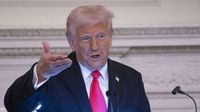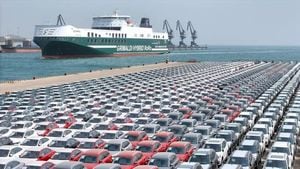In a bold move that has sent ripples through the automotive industry, U.S. President Donald Trump announced on March 28, 2025, that a 25 percent tariff will be imposed on all auto imports from the European Union, effective April 3. This decision marks a significant escalation in the ongoing trade dispute between the U.S. and the EU, impacting a wide range of vehicles from compact cars to SUVs and light trucks manufactured outside the United States. Additionally, a similar tariff will apply to imported auto parts, set to take effect no later than May 3, 2025.
The implications of these tariffs are vast, especially for Germany, which stands as the fifth largest auto exporter to the U.S. with exports valued at approximately $26 billion in 2024. Notably, the U.S. accounted for 13.1 percent of Germany's total car exports, making it a crucial market for German automakers.
Trump's rationale for the tariffs is rooted in his administration's broader agenda to "Make America Great Again," viewing the tariffs as a means to bolster U.S. revenues and offset the costs of promised tax cuts. As stated by the President, "One of the reasons I impose tariffs is that we take millions of their cars – BMW, Volkswagen, Mercedes-Benz. At the same time, it is 'almost impossible' to export U.S. cars to the EU." This statement underscores a belief that foreign manufacturers are benefiting disproportionately from the U.S. market.
Experts suggest that the tariffs may serve as a strategic bargaining chip for Trump, aimed at negotiating more favorable trade terms with the EU. According to economic analyst Johannes Mayr, the tariffs could also be a tactic to pressure Europe into increasing its defense spending, addressing U.S. export deficits in the process. Mayr notes, "In an arms race, there’s no way around American weapons for now. The U.S. can reduce its deficit through increased exports as well."
While the immediate economic impact of the tariffs on Germany may be limited, certain sectors and regions are likely to bear the brunt of the consequences. Industry insiders have labeled the sharp increase in tariffs from a mere 2.5 percent to 25 percent as a severe setback for an already struggling German automotive sector.
Mercedes-Benz, a key player in the automotive industry, has responded to these developments with caution. Ola Källenius, the CEO of Mercedes-Benz, emphasized the company's deep-rooted presence in the U.S., stating, "Mercedes has been in the U.S. for 120 years, almost as American as any other American company and older than most American companies." Despite this, Källenius expressed a desire to avoid escalating the trade conflict, warning that it could disrupt trade flows in both directions and pose economic challenges.
Mercedes-Benz operates two major manufacturing facilities in the U.S., including a plant in Tuscaloosa, Alabama, which produced 260,000 vehicles last year and employs around 6,000 people. Approximately two-thirds of the output from this facility is exported. In addition, the Charleston, South Carolina plant, which manufactures Sprinter vans, employs about 1,700 workers. In total, Mercedes sold 324,500 passenger cars and 49,500 vans in the U.S. last year.
Källenius highlighted the potential risks to Europe, stating that it could be the region that suffers the most if markets close off due to trade tensions. He pointed out that Europe's economic model has been export-driven since World War II, making it particularly vulnerable to protectionist measures. "Let’s not forget what has driven growth over the last 30 years. Trade has played an extremely important role," he remarked.
As the tariffs loom, the automotive industry braces for a period of uncertainty. Analysts are closely monitoring how these new tariffs will influence consumer prices, production decisions, and ultimately, the dynamics of international trade. The situation remains fluid, with many stakeholders advocating for diplomatic solutions rather than escalating trade wars.
The imposition of these tariffs is poised to reshape the landscape of the automotive market, particularly for European manufacturers. As the industry navigates these turbulent waters, the focus will likely be on how companies adapt their strategies in response to the changing trade environment.
In conclusion, while the tariffs may be intended to protect American interests, the broader implications for the global automotive industry and international relations remain to be seen. The coming weeks and months will be critical in determining how this trade conflict unfolds and what it means for consumers and manufacturers alike.





